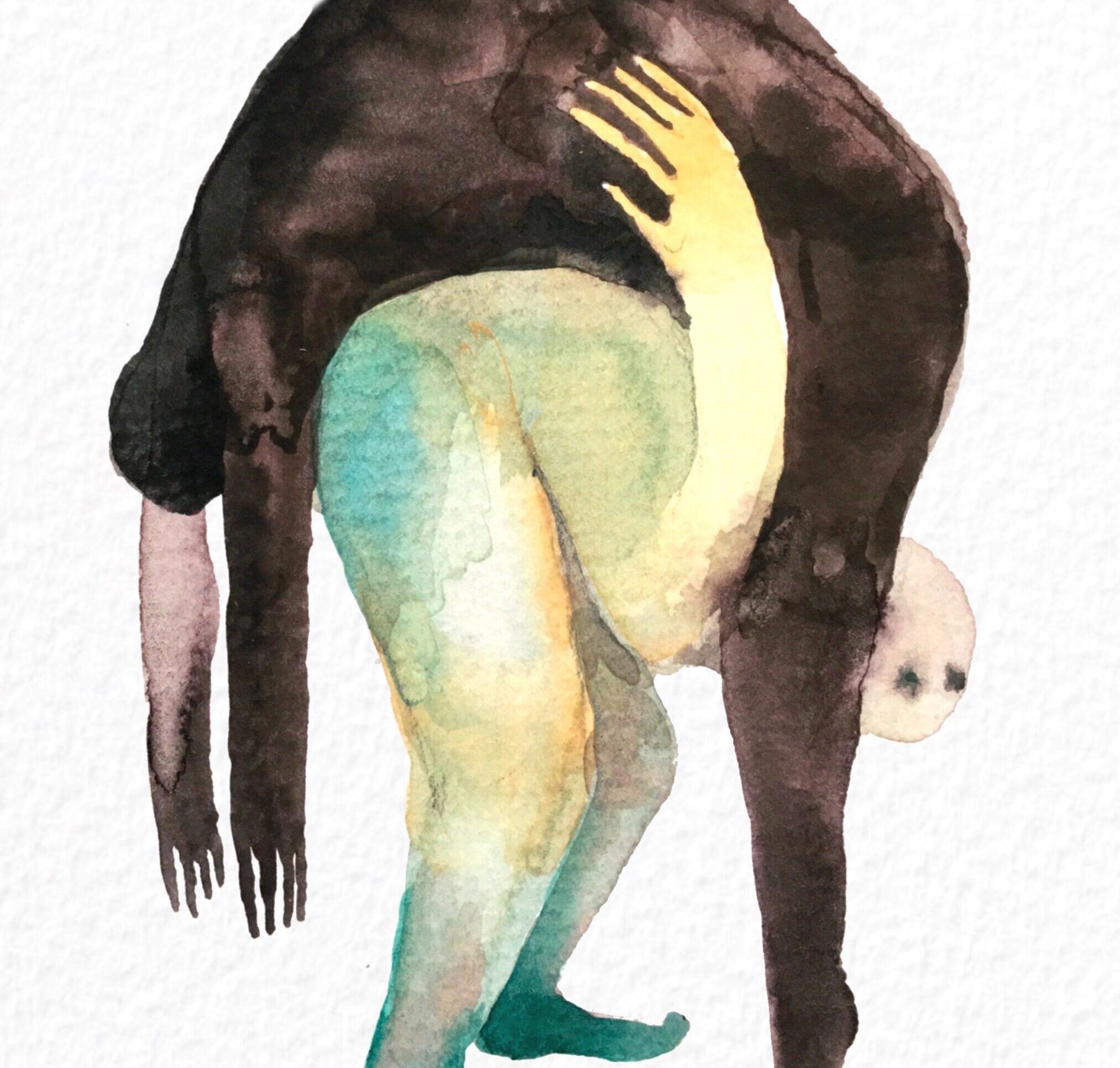Written by G.J. Hodson.
Art by Katie Green
Good working class kids are supposed to get an education, make money, and start a family. They’re not supposed to come home after six years away, single and unemployed. But D.C. had felt impenetrable, and my LTR felt like we’d compromise ourselves to death. I couldn’t articulate what was missing.
Soon after my return, my adoptive grandmother passed away, leaving my adoptive grandfather exhausted from care giving but otherwise healthy. He had never lived alone, and staying with him meant we could look out for each other. I’d be there if he ever needed me, and I wouldn’t be constrained by room and board. I could explore and write and take jobs because they were interesting.
My first new friends were all older polyamorists; their divorces had overlapped my quarter-life crisis. I savored getting to know people – physically or otherwise – as long as it was intense and illuminating. I fell in love, I fell in lust, I stumbled through my first few attempts to disentangle all these emotions and their expectations. I was young and hot and I cared about other people’s feelings, so my mistakes were forgiven. I was never prepared for relationships to end, yet I soaked up intimacy unguarded.
I wanted to know and share myself while remaining ethical and accountable. To deepen the conversations, I started facilitating meet-ups and traveling. Locals loved when I talked about sex but balked when I talked about breakups as a life skill. They smiled and nodded when I talked about “communication” and “enthusiastic consent” and “community”.
My grandfather’s dementia came on slowly, then all at once. Being close made it easier, but caregiving was completely new: managing a household, humoring incessant questions, keeping up with doctors. One crisis would end and I’d wait around for another.
My grandfather’s dementia came on slowly, then all at once. Being close made it easier, but caregiving was completely new: managing a household, humoring incessant questions, keeping up with doctors. One crisis would end and I’d wait around for another.
I found a stable polycule: three working moms, all older and more introverted than me. Trying to be there for them and my grandfather meant putting four people’s needs ahead of my own. I felt saddened when no one else showed up in my time of need: family of origin, colleagues, flirtations. Where was the “community” I’d built through my workshops? Where were my 500 Face-friends? We left the local polyamory network, which was being overrun with libertarian hobbyists and paternalistic BDSMers. I even pulled back from activism, doomed to watch the world argue over my values on screens.
Our dates gradually deteriorated: less wordplay and philosophy, more processing; less sensual exploration, more Netflix and chill. My partners urged me to improve my self-care; I sometimes succeeded. I urged us to collaborate better; we sometimes succeeded. When someone’s needs weren’t getting met, we’d be too drained to find further support.
We practice the skills of caregiving: attentiveness, compassion, boundaries, self-care, simplicity, and healing.
Time itself started to break down – or maybe it was just the depression. Several years in, my grandfather started falling; I committed to placing him somewhere safer. Moving my grandfather into memory care was the hardest thing I’d ever done. I’d visit often, and he walked me to the exit as he’d always walked me to the driveway. Once, he said, “I want you to know I understand what you did and I’m okay with it. I want you to go and live your life.” Most care partners never get to hear that; I ran to tell the group chat.
I asked the polycule what they needed from me to move forward together. One partner stayed for a year and some travel; we’d break up days before my grandfather died. Another was already pulling away; she would slow-ghost after the funeral. The partner who suggested some travel while centering healing moved in, and stayed.
These days, our canon is less The Ethical Slut or 20-year old blogs and more the works of Leah Lakshmi Piepzna-Samarasinha or mutual aid servers on Discord.
It’s no coincidence that the handful of people who checked on me during care giving burnout remain the most cautious about COVID. We share virtual spaces to keep the loneliness at bay, we spend weeks arranging brief meet-ups that honor and protect our most vulnerable, and we swipe left on anyone who won’t even negotiate precautions.
These days, our canon is less The Ethical Slut and more the works of Leah Lakshmi Piepzna-Samarasinha or mutual aid servers on Discord. Instead of fretting about being outed to work or family, we swap remote job recommendations and cheer on those friends who’ve managed to GTFO from states hostile to queer existence.
We practice the skills of care giving: attentiveness, compassion, boundaries, self-care, simplicity, and healing. We also practice the skills of sexual liberation better than ever: consent, body awareness, negotiation, innovation, meta-communication, educating ourselves, and perpetually checking in.
I may go months or years between sexy new adventures (they were never as numerous as people assumed), but I’m living sexual liberation by rejecting normative scripts and creating spaces for ethical vulnerability. Since most of my community members are demisexual or monogamous, I don’t get to flirt like I used to, but it’s a small price to pay to know that, finally, we are looking out for each other.
About the Author
G.J. Hodson (he/they/she) is a caregiving scholar, coach, and educator based in North Texas. Before being transformed by care, they were known as “Free”, a traveling “poly am-bad-ass-ador” whose workshops included “Building a Better Break-up” and “Hell Yes! How I Learned to Stop Worrying and Love Casual Sex.” View and support their work at http://linktr.ee/theoriesofcare.
Follow on IG: @theoriesofcare |

